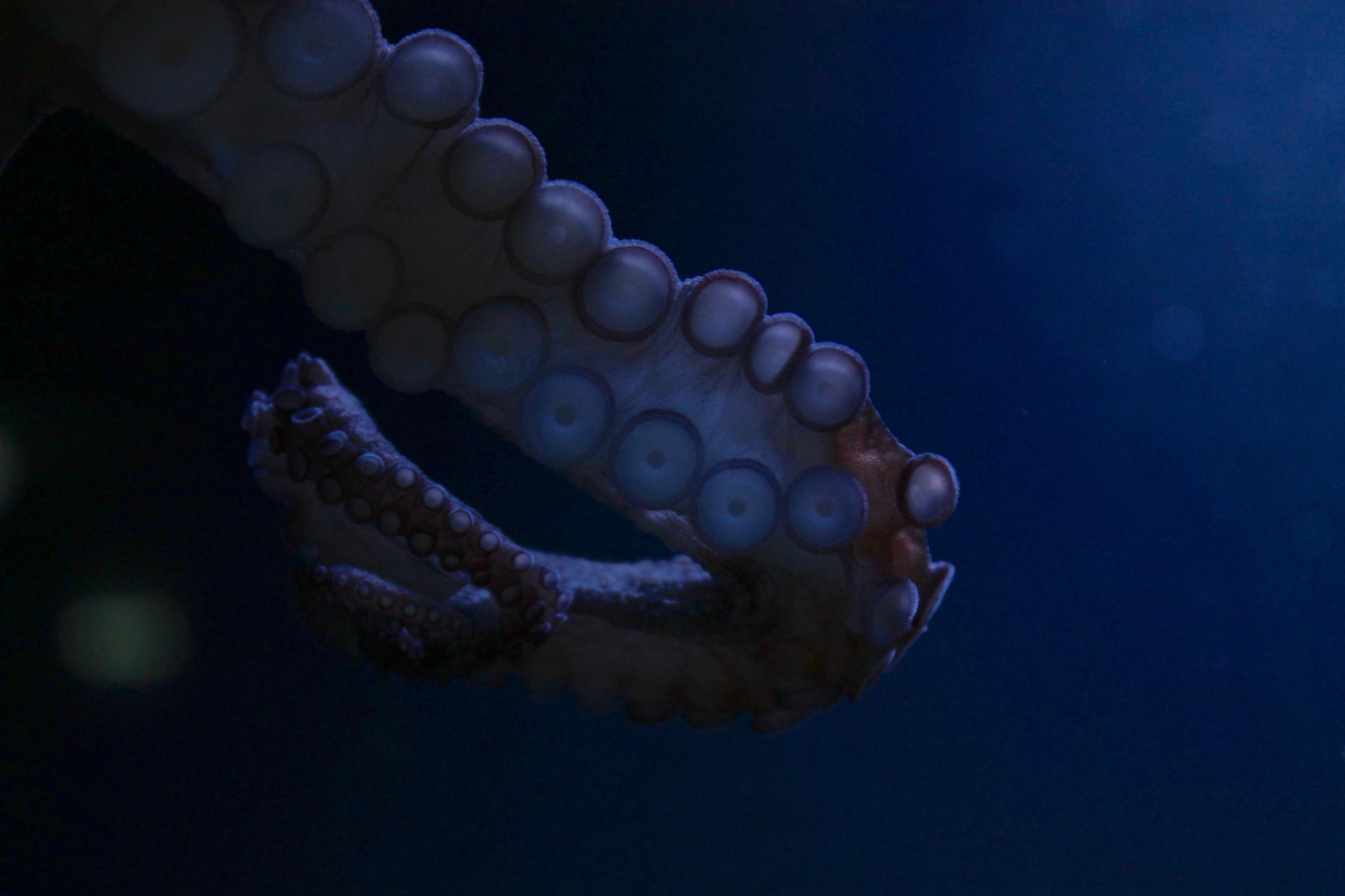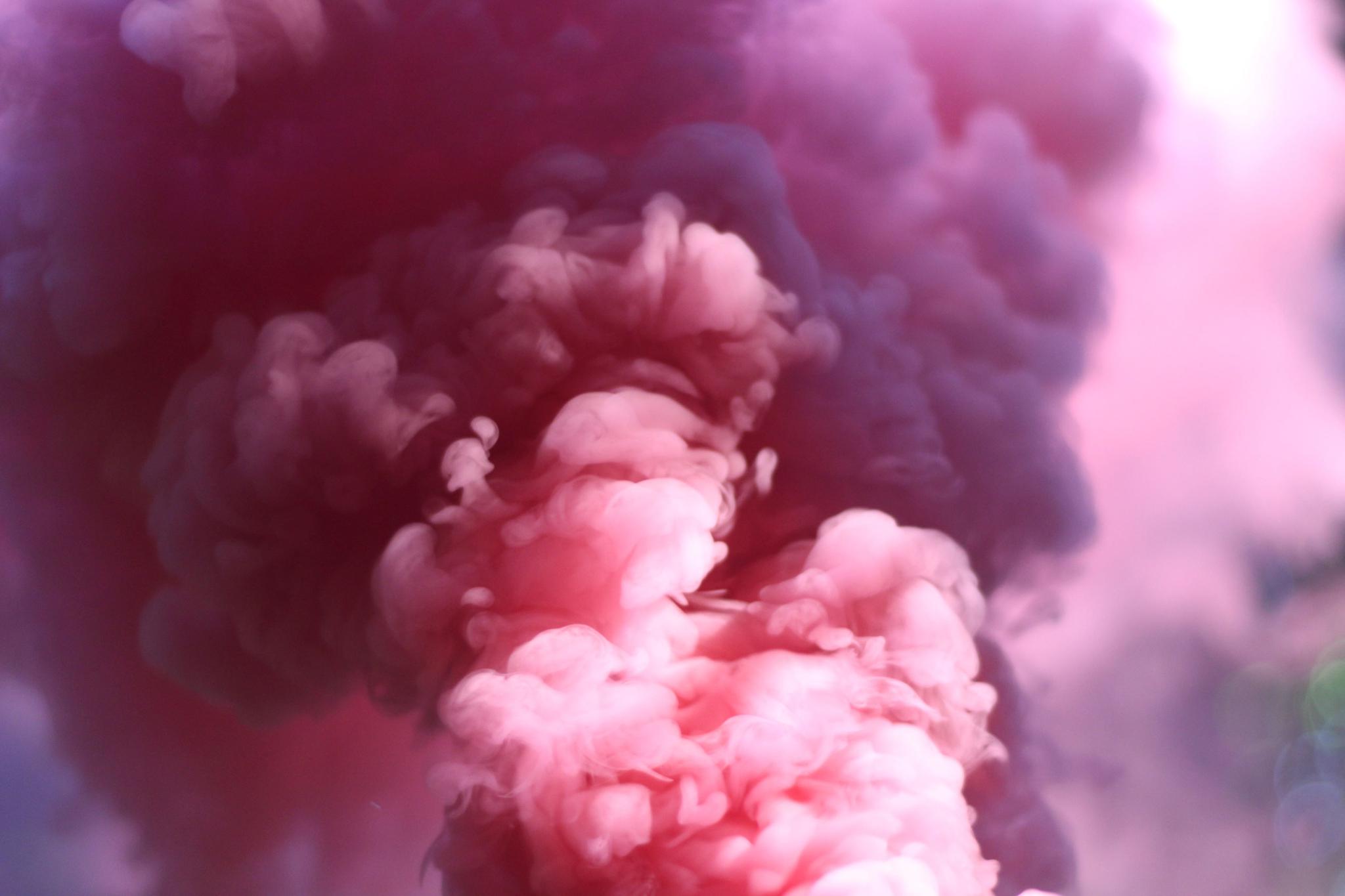Fiona Glen: 'Unseemly Figures'
When I was very young and Disney films were hand-drawn, I loved them doubly: once for their colourful animal characters (as anthropomorphised or obediently grinning as they often were), once for their affirmation of the world-making power of drawing. It was witchcraft, how those angular-smooth lines stitched shifting universes together. And I loved The Little Mermaid with its companion fish and coral reef vibrancy. Ursula, why would Ariel ever choose land over sea?
To meet you, the little mermaid follows your eel allies into the mouth of a dragon’s skeleton: your lair. In its gullet, the green-brown bodies of captured souls, a gut-like lining of fibres, stretch out wretchedly to tangle around her wrists. Corkscrews of magenta algae dangle like intestines in your boudoir. You drop from the smooth mouth of a giant shell, sashay on loose tentacles to your dressing table, swell your quiff with a thick white cream, and slick your lips scarlet with the pulped inner flesh of a clam. A raw pout – one black beauty spot – four crescents of turquoise eyeshadow. Your stage face is publicly constructed. Crude.
A full-bodied foil to Ariel’s preppy fragility, you are heavy-jawed; folds blossom across your back when you twist to regard us over your shoulder. Your bust bounces and your flesh flows in soft slopes, neck rounding into décolletage, arms curving out and downward, all a deadly-nightshade lilac. The little mermaid squirms from your touch. You lift her dainty chin with one devilishly pointed finger.

Sea-witch, I watch you for the first time with adult eyes, fractured into online clips and sutured into tributes, and I understand: an unwed un-mother is a lonely hunter, an octopus. Revelling in your own expansiveness, innuendos roll off your tongue and suggestions swing in your hips. Against the teal, sealed mermaid tails, your tentacles flail in vaudeville skirt flicks; they crown an orifice liberally, speaking a leakiness. Self-enchanted shapeshifter, if you can take any figure, this one must mean home to you.
Daughter of Poseidon, with your naturally clambering tendencies, you struggled to rule against your brother, the new King of the Sea, and were banished by him to lower layers (lairs) of the ocean. Like cellars, basements, shadow alleys, off-grid grottos, secret apartments, illegal venues, underground clubs. It’s glaringly clear now – in your vampy purples, your nightlife-neon pinks popping from sucker cups, your soft and shameless bigness, a subcultural sexuality sits roundly. An uncontainable animal-woman, a hybrid. Monsters are so often chimeras – flamboyant composites and dirty mergers.
I’ll admit that in the past I’ve been a nasty, they weren’t kidding when they called me, well, a witch...
Bobbing rumpily to the melody, between Broadway and Burlesque, your tentacles swish an extravagant fan –
and I fortunately know a little magic
you pluck a spindly merman and plump merwoman from a cauldron
I use it on behalf of the miserable, lonely and depressed
you treble the breadth of the man’s chest and shrink the woman to a slinky fraction of her former self
but it’s happened once or twice, someone couldn’t pay the price
then you singe them into clutching, dismayed worms.
Love in vain, or vanity.
Ursula, are you reaping vengeance against punishing beauty ideals? Against the fetish for a thin-fit ‘perfect’ body? Or against the muscular ocean god-patriarch, brother Triton all silver-bearded honour and wisdom?
You toy with those poor unfortunate souls’ desperation for love, beauty, children, continuity. You refuse to truly tend anyone except those two wonky eels (MY BABIES!). You have made your own family, like so many queer ‘others’. You are not really alone.
Should we feel sorry for you, Ursula? You are not sorry for yourself, creeping the seafloor. My bias turns to your side – the indulgent, the bad. Toothy leers and cool colours.
I AM THE RULER OF ALL THE OCEAN
THE WAVES OBEY MY EVERY WHIM
The cloud of furious black ink billows all around you
A swollen colossus lit grotesquely from below
Towering over your storm and a spinning fleet
SO MUCH FOR TRUE LOVE!
The Prince spins the galleon’s wheel
drives the pointed prow straight through your stomach
a headland impaled.
You scream crackling with lightning melting deflating a carnival castle
the great woman-monster is fallen bulging
eyes and chest
boiling bubble-gum blood oozes across the surface of the sea
a great vomited pop-pink oil spill
the bile of a slain monster
a fallen woman.

Ursula, it’s the era of the villain. There is space for you here, now; Maleficent, The Wicked Witch of the West, and The Joker have had their turns.
Ursula, the fourth century saint, was martyred by Huns (with eleven thousand fellow virgins) on her way to her wedding. Ironic, isn’t it? Ursa, for bear, became Ursula: she-bear or Great Bear, slightly sweetened. This little lady bear kept her claws. A soft-padding predator.
Ursula, I daydream: ur for origin, su for sea or she, la, the feminine lick that seals your name in our open mouths. Ursula, I am romanticising you, obsessing, seduced.
Descending into a pulpit of animate indigo tentacles
Queen Latifa is / playing/ you
live on Broadway and I watch you
that masterful cackle –
plume of platinum hair like a smoke column –
(you are on fire)
sculpted cheekbones disappear into your temples –
bronze arms glowing lilac light, flamenco-flamboyant
now ripping open your bodice (the audience
screams) to shed the great cradle
of limbs, theatrical
you strut free in a vinyl-shiny gown –
ON THE WHOLE I’VE BEEN A SAINT–
a scatter of pink glitter death –
one tentacle slung casual as a shawl
and now tight around a doe-eyed Ariel
and now rubbed against lower thighs as –
DON’T UNDERESTIMATE THE IMPORTANCE OF
BODY LANGUAGE –
tossing a tongue into the sparking pit
language cooks, a bit of body
or voice seized and deployed, twisted
tongue, reclaimed song
ravishing.
Fiona Glen is a Scottish writer and artist living in London. Her work is concerned with ecologies, creatures, and compassion. For her final MA Writing project at the Royal College of Art, she is working on a tentacular text that follows the octopus into far-flung corners of contemporary culture and thought. You can find more of her work at www.fiona-glen.com
